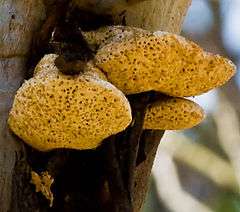Laetiporus portentosus
| Laetiporus portentosus | |
|---|---|
 | |
| In Attunga State Forest, New South Wales, Australia | |
| Scientific classification | |
| Kingdom: | Fungi |
| Division: | Basidiomycota |
| Class: | Agaricomycetes |
| Order: | Polyporales |
| Family: | Fomitopsidaceae |
| Genus: | Laetiporus |
| Species: | L. portentosus |
| Binomial name | |
| Laetiporus portentosus (Berk.) Rajchenb. (1995) | |
Laetiporus portentosus is a species of polypore fungus in the family Fomitopsidaceae. It is found in South America, Australia, and New Zealand. It has been used traditionally as a tinder and to carry fire by Australian Aboriginals,[1] and by New Zealand Māori people. The Māori have also used it as a "wound protector, to soften and ease a difficult labor."[2]
Taxonomy
The fungus was first described in 1844 by English mycologist Miles Joseph Berkeley. Mario Rajchenberg transferred it to the genus Laetiporus in 1995.[3] The fungus has acquired an extensive synonymy in the interim:[4]
- Polyporus portentosus Berk. (1844)
- Ungulina portentosa (Berk.) Pat. (1906)
- Piptoporus portentosus (Berk.) G. Cunn. (1965)
- Polyporus eucalyptorum Fr. (1846)
- Ungulina eucalyptorum (Fr.) Pat. (1906)
- Piptoporus eucalyptorum (Fr.) Warcup (1986)
- Polyporus leucocreas Cooke (1879)
- Polyporus spermolepidis Pat. (1898)
- Ungulina spermolepidis (Pat.) Pat. (1906)
- Ungulina spermolepidis var. pandani Pat. (1906)
- Polyporus spermolepidis var. pandani (Pat.) Sacc. & Trotter (1912)
- Polyporus albofuscus Lloyd (1924)
- Durogaster albus Lloyd (1924)
References
- ↑ Cunningham A, Xeufei Y (2012). Mushrooms in Forests and Woodlands: "Resource Management, Values and Local Livelihoods". Routledge. p. 53. ISBN 978-1-136-53817-9.
- ↑ Fuller R, Buchanan P, Roberts M (2005). "Medicinal uses of fungi by New Zealand Maori people". International Journal of Medicinal Mushrooms. 7 (3): 402. doi:10.1615/IntJMedMushrooms.v7.i3.470.
- ↑ Rajchenberg M. (1995). "A taxonomic study of the Subantarctic Piptoporus (Polyporaceae, Basidiomycetes) II". Nordic Journal of Botany. 15 (1): 105–119. doi:10.1111/j.1756-1051.1995.tb00127.x.
- ↑ "GSD Species Synonymy: Laetiporus portentosus (Berk.) Rajchenb.". Species Fungorum. CAB International. Retrieved 2015-11-04.
External links
This article is issued from Wikipedia - version of the 10/15/2016. The text is available under the Creative Commons Attribution/Share Alike but additional terms may apply for the media files.